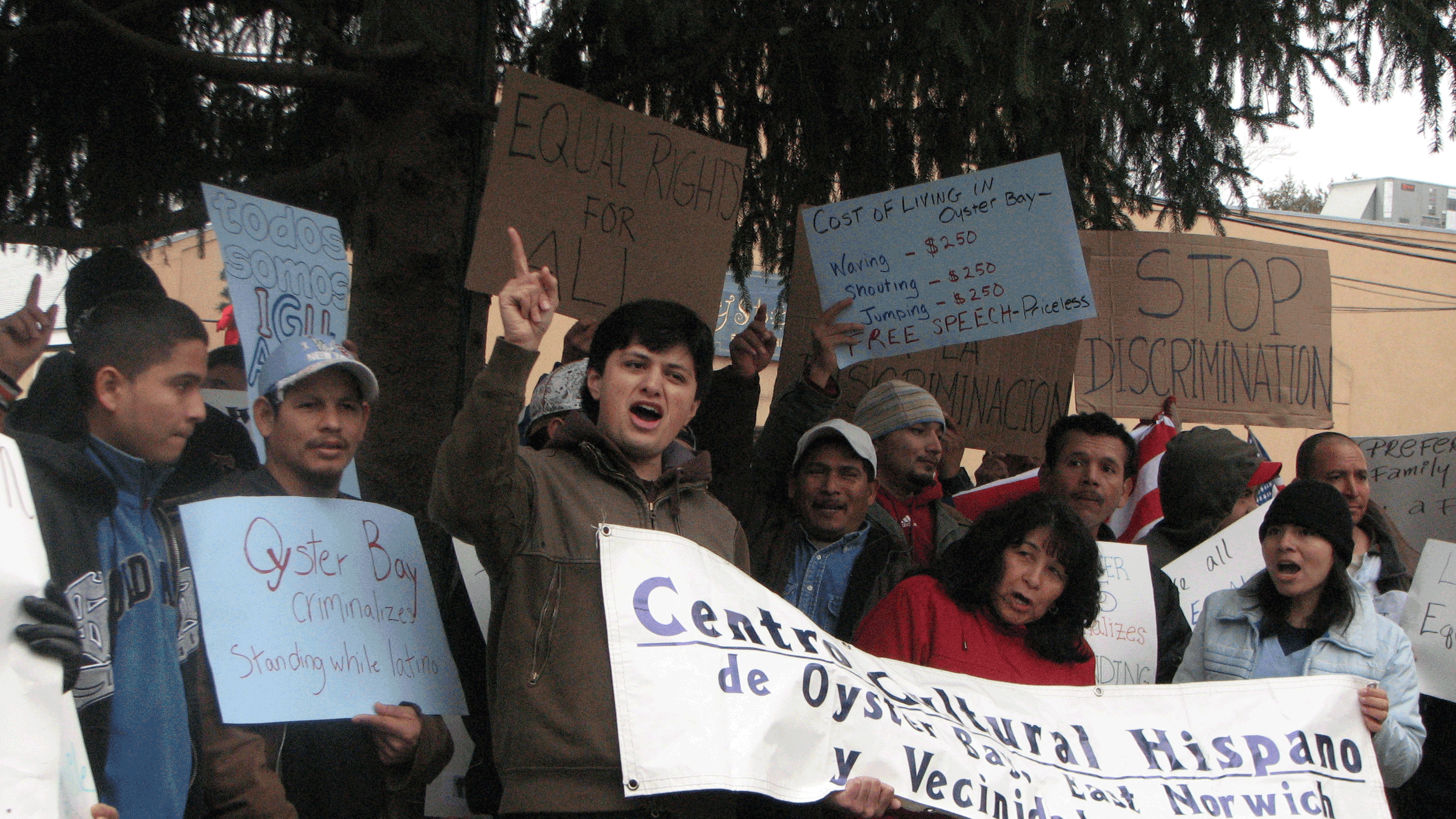NYCLU on Violent Crackdown of Pro-Palestine Protests at Columbia and City College
Civil Liberties Union
Two Long Island organizations that protect the rights of Latino day laborers filed a lawsuit today challenging an Oyster Bay town ordinance that violates core constitutional rights of free speech and equal protection under the law, and is intended to drive Latino immigrants from the community. On behalf of the Centro de la Comunidad Hispana de Locust Valley and the Workplace Project, the lawsuit was filed by the New York Civil Liberties Union, American Civil Liberties Union and LatinoJustice PRLDEF.

On behalf of the Centro de la Comunidad Hispana de Locust Valley and the Workplace Project, the lawsuit was filed by the New York Civil Liberties Union, American Civil Liberties Union and LatinoJustice PRLDEF.
“This misguided ordinance uses public safety as a smokescreen for intolerance and violates the constitutional rights of day labors and all Oyster Bay residents,” said Samantha Fredrickson, director of the NYCLU’s Nassau County Chapter. “It is a symptom of the anti-immigrant hostility that has swept across Long Island and the country in recent years.”
The lawsuit, filed in U.S. District Court for the Eastern District of New York against the town of Oyster Bay and Town Supervisor John Venditto, maintains that the ordinance violates the First and Fourteenth Amendments of the U.S. Constitution.
“The true purpose of this ordinance is to prevent a group of predominantly Latino day laborers from making a living in Oyster Bay,” said Cesar Perales, president and general counsel of LatinoJustice PRLDEF. “Day laborers are hardworking people and provide a valuable service to this community that we are all part of; their kids go to school here and they work, spend money and go to church. But as a result of this law, many of them have lost the ability to earn a living wage.”
Enacted in September 2009, purportedly to address traffic and pedestrian safety, the Oyster Bay ordinance prohibits standing on the sidewalk to solicit employment and bars motorists from stopping to solicit employment or hire workers. The ordinance criminalizes a wide variety of constitutionally protected speech that presents no threat to traffic safety, including, for example, students soliciting cars for a high school carwash fundraiser.
“Local attempts to regulate immigration by passing ordinances that restrict free speech are unconstitutional, ineffective, and only drain state and local budgets while hurting workers and local businesses,” said Farrin Anello, an attorney with the ACLU Immigrants’ Rights Project. “Standing on the sidewalk to let people know that you are available for work is not a crime. The Constitution protects all people in this country, regardless of their background.”
For nearly two decades, day laborers have gathered in Oyster Bay, particularly the Hamlet of Locust Valley and the Village of Farmingdale, to find work. Since passing the ordinance, the Town has stationed law enforcement officers at a corner at which workers and contractors typically meet, keeping contractors away from the site and intimidating workers seeking employment. The ordinance has had a devastating effect on the workers, who typically depend on these jobs to feed themselves and their families, and frequently lack transportation to seek work elsewhere.
“Oyster Bay’s ordinance is hurting families and it’s hurting children,” said Luz Torres of the Centro de la Comunidad Hispana de Locust Valley. “These people have to work so that they can feed, clothe and house their children, and they have the right to talk to anyone they want.”
In recent years, Latino day laborers in Oyster Bay have endured harassment and intimidation from neighbors, government officials and law enforcement when they gather to seek work. In a 2006 survey by Hofstra University’s Center for the Study of Labor and Democracy, more than 43 percent of day laborers on Long Island reported being targeted for slurs based on their nationality while more than a quarter reported having been threatened while seeking work. When residents of Farmingdale attempted to establish a hiring site for day laborers, news reports indicated that someone had left a .50-caliber anti-aircraft shell and carved the depiction of a gun in a picnic table at the proposed location.
At the same time, Latino immigrants across Long Island have increasingly faced discrimination, harassment and violence. In November 2008, Ecuadorian immigrant Marcelo Lucero was stabbed to death on Long Island following an altercation with local teens who were specifically trolling for a Latino victim. In 2003, the house of an immigrant in Farmingville was firebombed. Three years earlier in the same town, two Mexican day laborers were brutally beaten after being lured out of their home by the promise of work.
“Oyster Bay’s discriminatory law is promoting anger and distrust toward Latinos and contributing to an environment where we feel like constant targets of harassment,” said Nadia Marin-Molina of the Workplace Project. “The town should do everything in its power to ease tensions, not be fanning the flames of hate by passing unconstitutional laws.”
At a March 2009 Oyster Bay Town Board meeting, several Oyster Bay residents complained of the “invasion of day laborers,” calling the workers “unsafe and unsightly.” Following the meeting, the Town Board introduced the ordinance. At a May 2009 public hearing on the proposed ordinance, several residents and local lawmakers expressed displeasure with federal immigration policy. The board approved the ordinance unanimously.
Local lawmakers and police officials have never explained why current road safety laws – such as New York State’s vehicle and traffic laws – are inadequate to protect motorists or pedestrians. At the public hearing, no resident or Oyster Bay Town Board member indicated that a single traffic accident had occurred as a result of a day laborer soliciting work. The legislative record on the ordinance contains no evidence that the presence of day laborers causes traffic problems.
Lawyers on the case are Corey Stoughton, Adriana Piñón and Arthur Eisenberg for the NYCLU; Alan Levine and Christina Iturralde for PRLDEF; and Lee Gelernt and Farrin Anello for the ACLU.